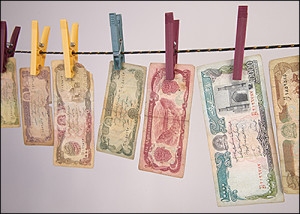Dirty Laundering Costs Developing Countries Billions
By Zaid Srourc, Marketing −

The European Parliament is developing new anti-money laundering laws to prevent corruption in developing countries.
Due to laundering, developing countries lose billions of dollars annually. Sadly, that money is routed to shady business deals by anonymous companies instead of funding public services like health care, food or national security.
Parliament Plans to Reduce Laundering
Recently, the European parliament started working on a new mandate to solve this problem. New policies will be made in order to “free up to $1 trillion in funds currently being stolen from the world’s poorest countries.”
The members of parliament are planning to tighten the regulatory environment, to encourage the public to be a part of the solution, and to work on new anti-money laundering laws.
The Goal
The primary purpose of this initiative is to address the issue of funds that are stolen from poor countries and then taken to Europe to be laundered through banks and anonymous corporations.
The goal is to flush out corrupt individuals from their hiding places and expose them. By doing so, the hope is that more countries see an end to the abuse of public resources.
There is great hope that the European Union will strengthen its economy if they are able to garner support. Finding those responsible can be difficult and requires strong evidence; perhaps one way to bolster the effort would be to administer lie detection tests.
A Potential Solution
EyeDetect™ is a new lie detection technology capable of identifying deception and fraudulent behavior with 85 percent accuracy. EyeDetect employs a simple test to observe eye behavior and uses the resultant data to determine a person’s credibility.
Periodic lie detection exams can be used to catch corrupt government officials, employees or even criminals before they continue to do more harm.
Ultimately, effective methods need to be employed to weed out those in positions of trust who take advantage of the people they serve.

